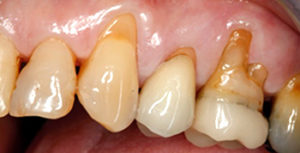Do suffer from tooth sensitivity? Well, you may have gum recession. Over the next two weeks with Hartwell Dentistry in Camberwell, we will be explaining what gum recession is, how it occurs and what can be done repair it.
What is Gum Recession?
Gum recession is a dental term used to describe where the gum has shrunk [receded] away from the tooth exposing the soft underlying tooth surface (the tooth root). Gum recession can be caused by trauma, disease or due to the positioning of your teeth. Some of these causes can be prevented with knowledge and brushing technique, although it is not possible to recover the already lost gum.
Causes:
- Anatomy – The position of teeth and the biotype (thickness of gingival tissue) can make an individual at higher risk of gum recession.
- Trauma – This can occur from excessive brushing, poor brushing technique, or from accidental trauma from hard foods.
- Disease – Periodontal disease is the loss of bone and gum support, when we have lost the underlying support of bone, gums will recede.
- Grinding – Grinding or clenching can cause too much force on your teeth causing gums to recede.
Effects:
Several things happen over time when gum recession takes place:
- Appearance – root surfaces of our teeth are orange-yellow in colour and can stain faster than enamel – this can cause the colour of the base of your teeth to appear a darker colour.
- Sensitivity – the soft root surfaces are more porous in nature and therefore react to cold beverages and acidic foods.
- Wedging – with years of exposure to brushing, abrasive toothpastes and acidic foods, the root surfaces of our teeth break down (like water on stone). This can make a ditch or a wedge like feeling at the base of your tooth.
- Food packing – when gums recede, gaps can form between our teeth which develop allowing food to become caught and trapped.
- Loss of teeth – in severe cases, advanced gum recession can be an indicator of poor bone support. People can lose teeth because of difficulty with cleaning and having an increased risk of infection.
Gum recession is not necessarily dependant on age. Medical conditions such as diabetes and smoking can increase the risk of gum disease and recession. To find out if you are at risk of gum recession, you can do a bit of research into your own family history. Gum disease and gum recession can be hereditary, as is diabetes.
There are procedures that can allow you to gain back your gum to help with appearance, sensitivity and overall health of your mouth. Two of the most successful method to fix this problem can be done here at Hartwell Dentistry. For more information on this please ask your oral health therapists and our dentists.
Next week with Hartwell Dentistry we will be discussing different gum treatments available to our patients.


